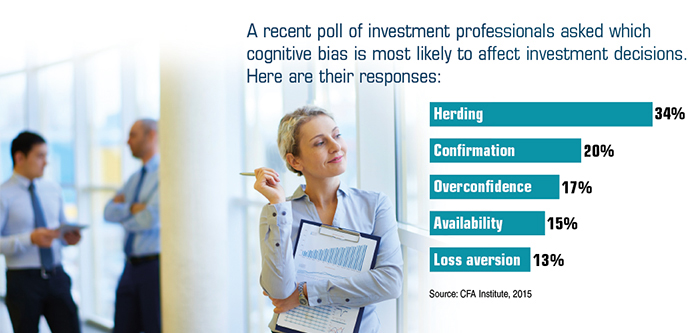Investors Are Human, too
Investors Are Human,TooIn 1981, the Nobel Prize–winning economist Robert Shiller published a groundbreaking study that contradicted a prevailing theory that markets are always efficient. If they were, stock prices would generally mirror the growth in earnings and dividends. Shiller’s research showed that stock prices fluctuate more often than changes in companies’ intrinsic valuations (such as dividend yield) would suggest.1 Shiller concluded that asset prices sometimes move erratically in the short term simply because investor behavior can be influenced by emotions such as greed and fear. Many investors would agree that it’s sometimes difficult to stay calm and act rationally, especially when unexpected events upset the financial markets.
Researchers in the field of behavioral finance have studied how cognitive biases in human thinking can affect investor behavior. Understanding the influence of human nature might help you overcome these common psychological traps. Herd mentality. Individuals may be convinced by their peers to follow trends, even if it’s not in their own best interests. Shiller proposed that human psychology is the reason that “bubbles” form in asset markets. Investor enthusiasm (“irrational exuberance”) and a herd mentality can create excessive demand for “hot” investments. Investors often chase returns and drive up prices until they become very expensive relative to long-term values. Past performance, however, does not guarantee future results, and bubbles eventually burst. Investors who follow the crowd can harm long-term portfolio returns by fleeing the stock market after it falls and/or waiting too long (until prices have already risen) to reinvest. Availability bias. This mental shortcut leads people to base judgments on examples that immediately come to mind, rather than examining alternative explanations. It may cause you to misperceive the likelihood or frequency of events, in the same way that watching a movie about sharks can suddenly make it seem more dangerous to swim in the ocean. Confirmation bias. People also have a tendency to search out and remember information that confirms, rather than challenges, their current beliefs. If you have a good feeling about a certain investment, you may be likely to ignore critical facts and focus on data that supports your opinion. Overconfidence. Individuals often overestimate their skills, knowledge, and ability to predict probable outcomes. When it comes to investing, overconfidence may cause you to trade excessively and/or downplay potential risks. Loss aversion. Research shows that investors tend to dislike losses much more than they enjoy gains, so it can actually be painful to deal with financial losses.2 Consequently, you might avoid selling an investment that would realize a loss even though the sale may be an appropriate course of action. In some instances, the intense fear of losing money may be paralyzing. It’s important to slow down the process and try to consider all relevant factors and possible outcomes when making financial decisions. Having a long-term perspective and sticking with a thoughtfully crafted investing strategy may also help you avoid expensive, emotion-driven mistakes. All investments are subject to market fluctuation, risk, and loss of principal. When sold, investments may be worth more or less than their original cost. Past performance does not guarantee future results. 1) The Economist, May 1, 2015
The information in this article is not intended as tax or legal advice, and it may not be relied on for the purpose of avoiding any federal tax penalties. You are encouraged to seek tax or legal advice from an independent professional advisor. The content is derived from sources believed to be accurate. Neither the information presented nor any opinion expressed constitutes a solicitation for the purchase or sale of any security. This material was written and prepared by Emerald. Copyright 2016 Emerald Connect, LLC. |
| PrudentProspera.com |
| 5506 Sunol Blvd. suite 205 | • | Pleasanton, CA | • | 94566 |
| Phone: 925-523-3459866-900-8376 | • | Fax: 815-333-3445 |
| www.prudentprospera.com | • | Atul@PrudentProspera.Com |




